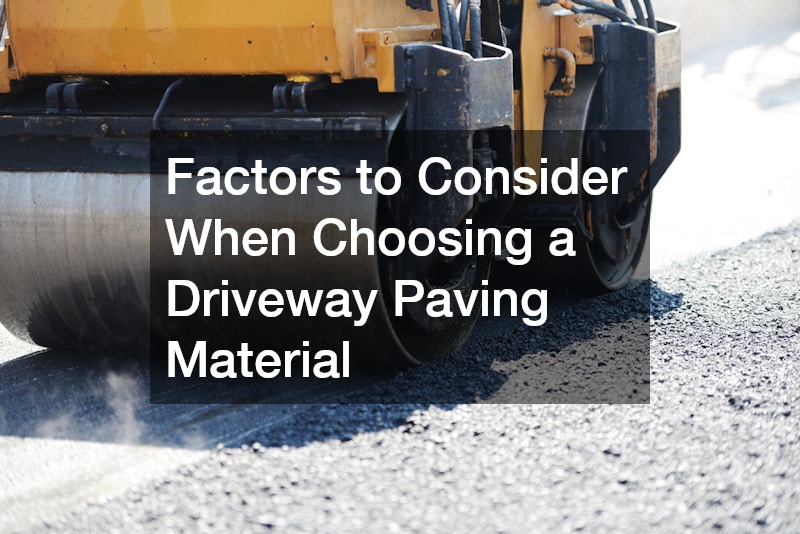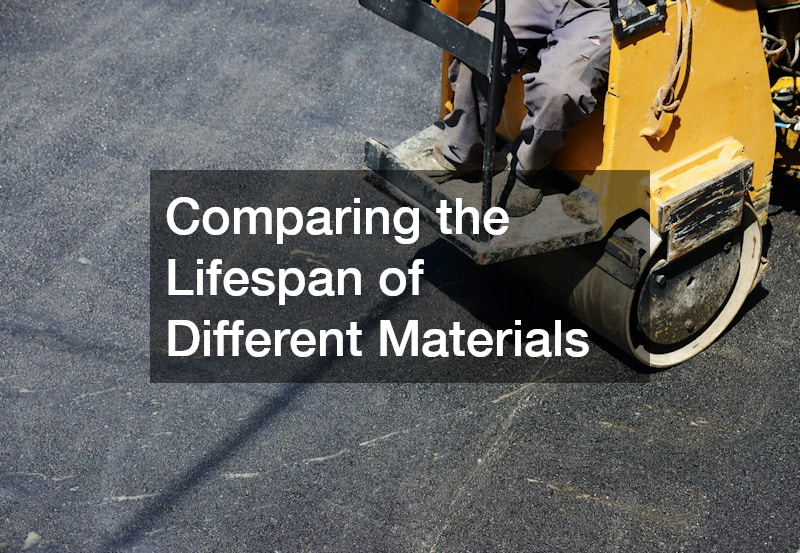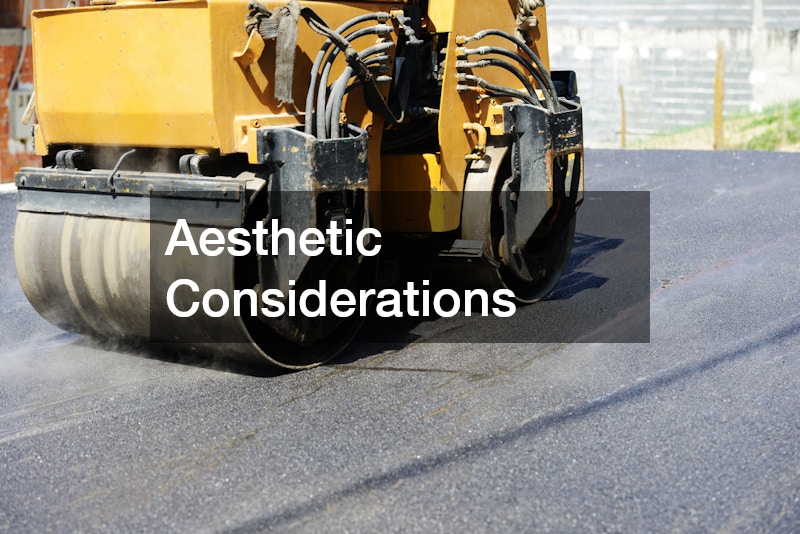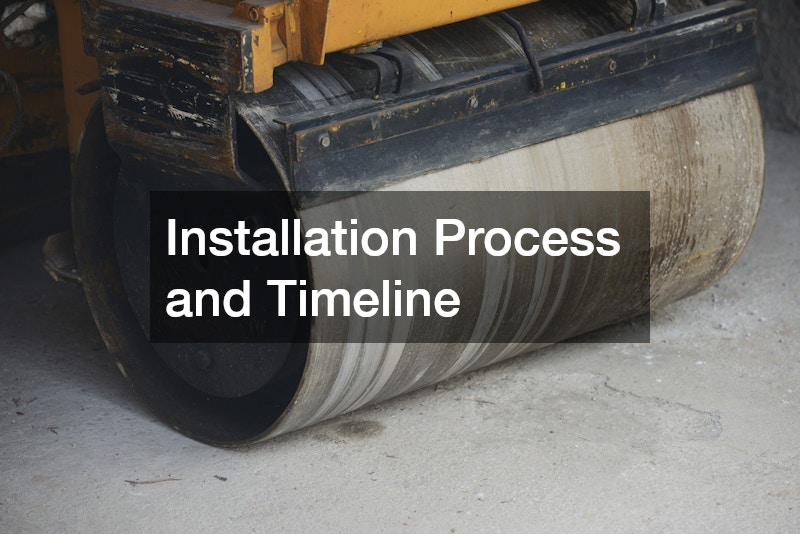A well-paved driveway not only enhances the curb appeal of your home but also adds to its overall functionality and value. Whether you’re upgrading an existing driveway or installing a new one, choosing the right paving material is an important decision. With so many options available, understanding the pros and cons of each material will help you make an informed choice that suits your budget, style, and long-term needs.
In this guide, we’ll walk you through the factors to consider when choosing the best paving material for your driveway. We’ll explore the most popular materials, discuss their benefits, and examine the importance of professional installation by asphalt driveway experts and paving companies. Whether you’re looking for a cost-effective solution or a more luxurious design, this guide will help you make the right decision for your home.

1. Factors to Consider When Choosing a Driveway Paving Material
Before diving into the different types of paving materials, it’s important to understand the key factors that should influence your decision. These include:
Budget
The cost of your driveway is one of the first things to consider when choosing a material. While some materials like gravel are relatively inexpensive, others, like brick and cobblestone, can be much more expensive due to the cost of materials and labor. Asphalt driveway experts and local paving contractors can provide accurate estimates to help you understand the costs involved.
Climate and Weather Conditions
Your local climate plays a significant role in the longevity and performance of paving materials. For example, extreme cold or heat can cause certain materials, like concrete, to crack more easily. In colder climates, asphalt may be a better option as it performs well in freeze-thaw cycles. Asphalt paving companies often recommend asphalt for homes in areas with harsh weather conditions.
Durability
How long do you want your driveway to last? Some materials, such as concrete, are incredibly durable and long-lasting, while others, like gravel, may require more frequent maintenance and replacement. Asphalt services from a qualified asphalt contractor can provide you with durable and cost-effective solutions.
Aesthetic Appeal
Your driveway is one of the first things people see when they visit your home. The style and color of your driveway can enhance the appearance of your property. Paving services can offer a variety of materials that suit different home styles, from rustic gravel to elegant brick.
Maintenance Requirements
All driveways require maintenance, but the extent and frequency of maintenance vary depending on the material. Asphalt driveways, for example, require periodic sealing and asphalt crack repair to ensure they last. Concrete driveways, while low-maintenance, can develop cracks over time, requiring repair. Paving contractors can help you understand what level of maintenance is required for each material.
Environmental Impact
Eco-friendly options are becoming increasingly popular in driveway paving. Permeable pavers, for example, allow water to drain through the surface, reducing runoff and promoting groundwater recharge. If you’re concerned about the environmental impact, you may want to discuss these options with local paving contractors.
2. Overview of Popular Driveway Paving Materials
Now that we’ve covered the key factors to consider, let’s look at the most common paving materials used for driveways. Each material has its own set of advantages and drawbacks, so understanding these will help you make the best choice for your home.
Asphalt Driveways
Asphalt is one of the most common materials used for driveways. It’s relatively affordable, durable, and easy to maintain.
Pros:
-
Cost-Effective: Asphalt is one of the most affordable paving materials, making it a popular choice for homeowners on a budget.
-
Durability: Asphalt driveways are long-lasting and can withstand a variety of weather conditions. When installed by an experienced asphalt driveway contractor, asphalt can last 20 to 30 years with proper maintenance.
-
Quick Installation: Compared to materials like concrete or brick, asphalt driveways can be installed relatively quickly, usually within a day or two.
-
Easy Maintenance: Asphalt requires regular sealing to prevent cracks and damage from weather and wear. Asphalt crack repair can also help extend the life of your driveway.
Cons:
-
Prone to Cracking: While asphalt is durable, it can crack over time, especially in areas with freeze-thaw cycles. Regular sealing and crack repair are essential for maintaining its appearance and functionality.
-
Fading: Asphalt may lose its black color over time due to sun exposure and weather conditions, but regular sealing can help prevent this.
Asphalt paving companies typically recommend asphalt for its combination of affordability, durability, and ease of maintenance. Whether you’re paving a new driveway or replacing an old one, asphalt is a reliable option for homeowners seeking a cost-effective solution.
Concrete Driveways
Concrete is another popular choice for driveways, known for its clean, smooth appearance and long lifespan.
Pros:
-
Durability: Concrete driveways are incredibly durable and can last up to 30 years with minimal maintenance.
-
Low Maintenance: Concrete requires little upkeep aside from occasional cleaning and sealing. Unlike asphalt, it does not require regular crack repairs, although it can crack over time.
-
Versatility: Concrete can be stamped, stained, or colored to create a variety of design options, making it a versatile choice for homeowners looking for customization.
Cons:
-
Higher Upfront Cost: Concrete driveways are more expensive to install than asphalt, which may be a consideration for budget-conscious homeowners.
-
Susceptibility to Cracking: Concrete is prone to cracking, especially in areas with extreme weather conditions. Proper installation by a paving contractor can help reduce this risk, but it’s still important to seal the surface and address any cracks as soon as they appear.
If you’re looking for a more durable and aesthetically customizable option, concrete may be the right choice for your driveway. However, it comes with a higher upfront cost and requires regular maintenance to prevent cracking.
Gravel Driveways
Gravel is one of the most affordable options for paving a driveway. It’s a great choice for homeowners looking for a rustic or country-style look.
Pros:
-
Affordable: Gravel is one of the least expensive paving materials, making it ideal for homeowners on a budget.
-
Quick Installation: Gravel driveways are relatively easy to install, and they can be completed quickly without the need for specialized equipment.
-
Permeable: Gravel is a permeable material, meaning water drains through it, which can help reduce runoff and promote groundwater recharge.
Cons:
-
Requires Maintenance: Gravel driveways can shift and develop ruts over time, requiring regular replenishing and grading. Weed growth can also be an issue.
-
Less Stable: Gravel can become uneven and can shift around, especially in areas with heavy traffic. This may require regular upkeep to maintain a smooth surface.
For those on a tight budget or looking for a more rustic aesthetic, gravel is an affordable option. However, the need for ongoing maintenance may be a turnoff for some homeowners.
Brick or Cobblestone Driveways
Brick or cobblestone driveways offer a classic, high-end look that can complement a range of architectural styles.
Pros:
-
Aesthetic Appeal: Brick and cobblestone driveways provide a timeless, elegant appearance that can add curb appeal and value to your home.
-
Durable: Both brick and cobblestone are highly durable and can last for decades when properly maintained.
-
Customization: Brick and cobblestone driveways can be customized with patterns, colors, and designs, allowing homeowners to create a unique look.
Cons:
-
High Cost: Brick and cobblestone driveways are among the most expensive materials to install due to the cost of materials and labor.
-
Labor-Intensive Installation: Installing a brick or cobblestone driveway requires skilled labor, which can add to the overall cost.
For homeowners seeking a luxurious and custom look, brick and cobblestone driveways are excellent choices. However, they come with a higher price tag and longer installation times.
Permeable Pavers
Permeable pavers are an environmentally friendly option that allows water to pass through the surface, reducing runoff and promoting groundwater recharge.
Pros:
-
Eco-Friendly: Permeable pavers help manage stormwater by allowing rainwater to filter through the surface, reducing runoff and preventing flooding.
-
Durability: Permeable pavers are durable and long-lasting, offering excellent resistance to wear and tear.
-
Aesthetic Flexibility: Permeable pavers come in various styles, colors, and shapes, offering a customizable design that can fit any home style.
Cons:
-
Higher Initial Cost: Permeable pavers are more expensive to install than traditional paving materials, and the installation requires specialized knowledge.
-
Maintenance: The joints between the pavers can fill with dirt and debris, requiring periodic cleaning to maintain optimal drainage.
For environmentally conscious homeowners looking to reduce runoff and improve drainage, permeable pavers are an excellent choice. However, they come with a higher initial cost and require regular maintenance to maintain their performance.

3. Comparing the Lifespan of Different Materials
One of the most important factors to consider when choosing a paving material is how long it will last. Here’s a comparison of the expected lifespan for various driveway materials:
-
Asphalt: An asphalt driveway can last between 20 to 30 years with proper care and regular asphalt crack repair. Asphalt paving services are designed to ensure that your driveway remains durable and long-lasting.
-
Concrete: Concrete driveways can last 30 years or more if properly maintained. However, they may be prone to cracking over time, especially in climates with freezing and thawing cycles.
-
Gravel: Gravel driveways typically last around 10 to 15 years, but their longevity depends on how well they are maintained and how often they are replenished.
-
Brick or Cobblestone: With proper care, brick and cobblestone driveways can last for 30 years or more, making them a long-term investment.
-
Permeable Pavers: Permeable pavers are highly durable and can last up to 30 years, depending on the material and installation quality.
4. Cost Breakdown
Cost is often one of the primary deciding factors when selecting a driveway material. Here’s a general breakdown of costs for each type of driveway material:
-
Asphalt: Installation typically costs between $2 and $5 per square foot. Asphalt is one of the most affordable options, especially when compared to brick or cobblestone.
-
Concrete: Concrete driveways are more expensive, with installation costs ranging from $4 to $10 per square foot, depending on design and customization.
-
Gravel: Gravel is the most affordable option, costing around $1 to $3 per square foot for installation. However, it requires more maintenance over time.
-
Brick or Cobblestone: Installation of brick or cobblestone driveways can cost $10 to $20 per square foot due to the high cost of materials and labor.
-
Permeable Pavers: Permeable pavers can cost between $6 and $15 per square foot for installation, depending on the type of paver and the complexity of the design.
The overall cost of installation, including labor, should be factored into your decision-making process. Asphalt driveway experts can offer estimates tailored to your specific needs and budget.

5. Aesthetic Considerations
When selecting a driveway material, the aesthetic appeal of your home is an important consideration. Your driveway is one of the first things people notice, so it should complement the style of your house. Here’s how different materials can enhance your home’s appearance:
-
Asphalt: Asphalt offers a clean, modern look but lacks the customization options of other materials. However, it is highly functional and blends well with most home styles.
-
Concrete: Concrete can be customized with stamps, stains, or colors to match your home’s aesthetic. It works well with both contemporary and traditional homes.
-
Gravel: Gravel provides a more rustic look, perfect for country-style or rural homes.
-
Brick or Cobblestone: These materials offer a timeless, high-end appearance and work well with traditional, Mediterranean, or colonial-style homes.
-
Permeable Pavers: Permeable pavers come in a wide variety of colors, shapes, and designs, offering a customizable solution for eco-conscious homeowners.

6. Installation Process and Timeline
The installation process can vary depending on the material, but here’s a general timeline for each type of driveway:
-
Asphalt: Asphalt driveways can typically be installed in one to two days, with minimal disruption.
-
Concrete: Concrete installation may take two to three days, including curing time.
-
Gravel: Gravel driveways can be installed quickly, often in a day or two.
-
Brick or Cobblestone: Brick and cobblestone driveways take longer to install due to the complexity of the labor involved.
-
Permeable Pavers: Permeable paver installation requires specialized knowledge and can take a few days, depending on the size of the driveway.
Choosing the right paving material for your driveway is an important decision that requires careful consideration of factors like budget, climate, durability, and aesthetics. Whether you opt for a cost-effective asphalt solution or a high-end brick driveway, working with an experienced asphalt driveway contractor or paving company will ensure that your driveway is installed correctly and built to last.
By taking into account all of these factors and consulting with paving contractors, you can make an informed decision that enhances the beauty and functionality of your home’s exterior. Don’t hesitate to reach out to local paving contractors or asphalt driveway experts to get a personalized recommendation for your specific needs.



